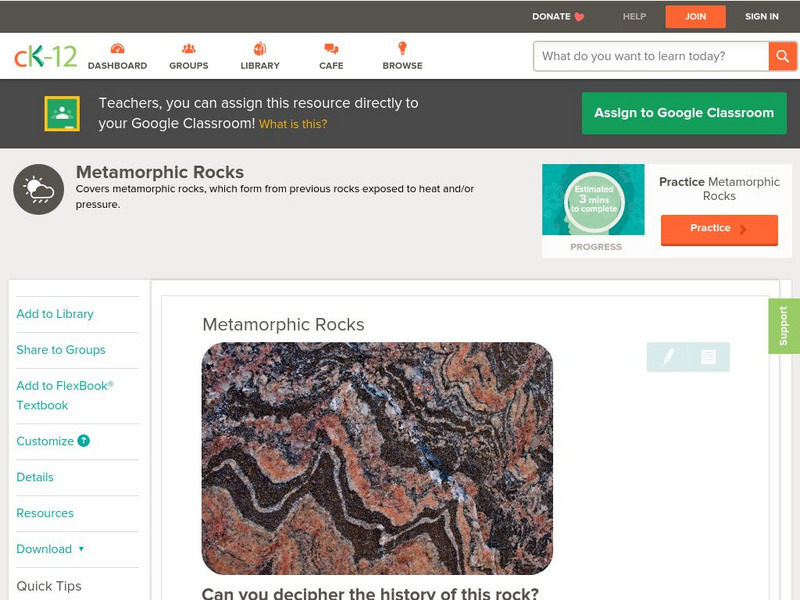Hi, what do you want to do?
Curated OER
Photosynthesis: Intake of Carbon Dioxide - Production of Oxygen
High schoolers, after a long-term observation of photosynthesis with aquatic plants, assess the benefits of photosynthesis towards all living organisms. They explain in their own words the two cycles within photosynthesis. Guided...
Curated OER
The Power of Atmospheric Pressure Process
Students are introduced to the basic principles of atmospheric pressure. After watching demonstrations, they discover the capability of air pressure and how it affects weather. In groups, they use an inquiry template to solve different...
Curated OER
Biomes
In this biomes worksheet, students review the characteristics of aquatic biomes and terrestrial biomes. This worksheet has 12 fill in the blank, 6 multiple choice, and 4 short answer questions.
Curated OER
Glacier Climbing
Students discover where glaciers exist and how they move. In this glacier instructional activity, students work in groups to create a glacier in a replica valley and observe its properties.
Curated OER
Forecasting Weather
In this weather worksheet, students review the different things a meteorologist studies and how they collect weather data. Students compare weather watch and weather warning. This worksheet has 10 matching and 3 short answer questions.
Curated OER
Global Climates and Seasons
Students look at the differences that exist in all four seasons. The resources of animation are available to be used to illustrate scientific concepts in a media that is engaging to students.
Curated OER
Tracking Ozone
Students track an ozone event in Groton, CT. They compare weather changes and the subsequent ozone levels. Also, they make comparisons and determinations about ozone levels.
Curated OER
Hottest, Coldest, Highest, Deepest: Science, 4th Grade
Fourth graders investigate weather patterns in their home state of Utah. After creating KWL charts, they research weather and geographical data to locate the state's extremes. As an extension, 4th graders write and illustrate books about...
Curated OER
The Inside Current
Eighth graders explore ocean currents and wind patterns. They discover the concept of systems to show how change in one component of a body of water, causes change in other components in that system. Students describe positive and...
Curated OER
Global Change — Change and Cycles Where Land, Air and Water Meet
Students participate in an experiment to define a parts-per-billion solution. For this ecology lesson, students select a second substance to create a parts-per-billion solution and observe and record their results. Students work in...
Curated OER
Out Of Sight Air; Weather
Fourth graders conduct an experiment to get them thinking about the invisibility of air, and to prove that air has weight.
Curated OER
Agriculture, Weather, Economy and Indiana
Fourth graders, in groups, investigate the role of weather in Indiana's farming economy. They make a prediction as to weather and its effect on the economy of Indiana. They present their data using a media presentation of data...
Curated OER
What does AG have to do with me?
Students practice alphabetizing while categorizing sources of basic agricultural products. They discuss agricultrual products, discover where they are grown and draw a simple agricultural scene on poster board.
Science Education Resource Center at Carleton College
Serc: Sea Ice Extension for the Earth as a System Learning Activity
The purpose of this lesson is for students to learn how the Earth's systems interact on a global level. They will examine global environmental data and compare this to data on the polar regions. In the process, they will develop an...
CK-12 Foundation
Ck 12: Earth Science: Metamorphic Rocks
[Free Registration/Login may be required to access all resource tools.] Covers metamorphic rocks, which form from previous rocks exposed to heat and/or pressure.
Other
Paleomap: Climate History
Have you wondered what the Earth's climate was like millions of years ago? Click on a period to view a map and explanation of ancient Earth's climate.
TED Talks
Ted: Ted Ed: Reasons for the Seasons
Why do some regions experience full-time heat while others are reckoning with frigid temperatures and snow? And why are the seasons reversed in the two hemispheres? Rebecca Kaplan explains how the shape of the Earth's orbit around the...
Science Struck
Science Struck: Hottest Country in the World
Discusses countries that have recorded the hottest temperatures and the one with the highest average temperature. Also lists the hottest countries for each continent and the hottest locations on Earth.
Science Struck
Science Struck: Top 12 Coldest Countries in the World
Provides brief descriptions of the twelve coldest countries in the world.
Utah STEM Foundation
Utah Stem Action Center: Air Masses
An air mass forms when the air over a large region of Earth sits in one place for many days. The air gradually takes on the characteristics of the land or water below it. Where Earth's surface is cold, the air becomes cold. Where Earth's...
Curated OER
Educational Technology Clearinghouse: Maps Etc: Summer Monsoon in India, 1910
A map from 1910 of the Indian subcontinent and the Central Asia region showing the typical rainfall distribution patterns during the summer monsoons, keyed to show areas of rainfall ranging from very light to, according to this text, the...
Curated OER
Educational Technology Clearinghouse: Maps Etc: Winter Monsoon in India, 1910
A map from 1910 of the Indian subcontinent and the Central Asia region showing the typical rainfall distribution patterns during the winter monsoons, keyed to show areas of rainfall ranging from very light to heavy rainfall. The map...






















